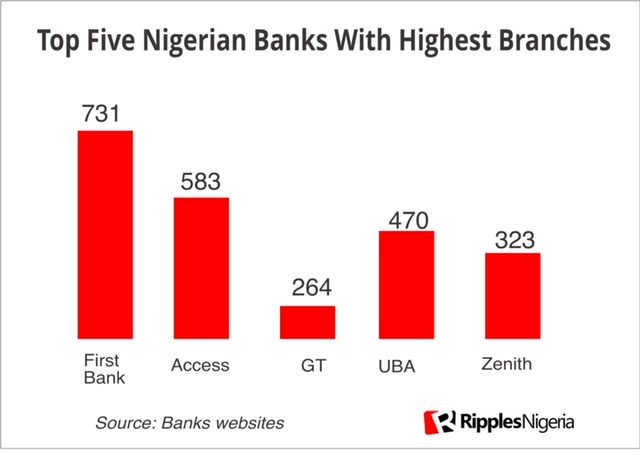Ripples Metrics
RipplesMetrics: Top five Nigerian banks with highest branches, as deadline to return old notes nears

The Central Bank of Nigeria in the last two months has announced several policies that have raised eyebrows among Nigerians.
From the new Naira notes to cash withdrawal limits, the policies have raised questions on commercial banks infrastructure.
The policy of redesigning the currency, according to CBN, requires Nigerians to deposit existing currencies in banks latest January 31, so as to have access to the new notes
On cash withdrawal policy, CBN noted that from 9th January, 2023 Nigeria’s over-the-counter cash withdrawals by individuals and corporate entities will not exceed N100,000 and N500,000, respectively per week, among others.
Issues from the policies and bank readiness
With over 42 million adult Nigerians reported to be lacking access to banking services as at December 2021, Nigerians are wondering how easy it would be for Nigerians in remote areas, especially the elderly to beat the deadlines.
CBN defends move
The CBN explained that the banking public in rural and/or underserved areas may access CBN branches in the 36 states of the federation to enquire about options for depositing their current N200, N500, and N1,000 notes, wallet/account opening processes, and financial access points, among others.
It stated that due to the policy, the agents have also been accorded priority to enable them deposit cash collections through bank branches across the federation.
READ ALSO:RipplesMetrics: President Buhari budgets N5,039 per citizen for medical care in 2023
In addition, it noted that the progressive increase in financial access points and alternative banking channels including electronic/internet banking, mobile apps, ATM, Cards/PoS, eNaira, agent banking, among others, may not be evenly distributed across all geopolitical zones and in some rural areas.
Data raise questions on banks readiness
According to World Bank’s most recent data, there are only 4.5 commercial Bank branches to every 100,000 adults in Nigeria and 16.15 ATMs to every 100,000 adult Nigerians (18 years and above).
Similarly, the Enhancing Financial Innovation and Access study, a UK’s Foreign Commonwealth & Development Office supported program noted that as of 2020, only 45 percent Nigerians were banked.
The report further noted that only one in every three adults in the rural areas of the country were banked, with banking services not reaching many places.
It added that 44 percent of the adult population (18 years and above) in the rural areas were excluded from banking services.
The 44 percent of the total population of adults in rural areas quoted by the EFInA, stands at 30.668 million persons excluded from banking activities in Nigerian communities.
Only four percent of the sampled communities in Nigeria by the ‘Enhancing Financial Innovation and Access’ study have bank branches, one percent have Automated Teller Machine (ATM) and 62 percent of these communities have no financial access points.
The big five and number of branches
According to CBN data, Nigeria has 22 commercial banks operating in Nigeria.
FBN Holdings, UBA Plc, Guaranty Trust Bank, Access Bank, and Zenith Bank are the five largest, based on customer deposits, assets, and cash reserves.
Checks by Ripples Nigeria show that the First bank of Nigeria has a total of 731 branches across the country.
UBA on the hand has 470 branches while GTB says it has 264 branches scattered across the country.
Access Bank, and Zenith Bank both have 583 and 332 branches respectively.
Join the conversation
Support Ripples Nigeria, hold up solutions journalism
Balanced, fearless journalism driven by data comes at huge financial costs.
As a media platform, we hold leadership accountable and will not trade the right to press freedom and free speech for a piece of cake.
If you like what we do, and are ready to uphold solutions journalism, kindly donate to the Ripples Nigeria cause.
Your support would help to ensure that citizens and institutions continue to have free access to credible and reliable information for societal development.

























